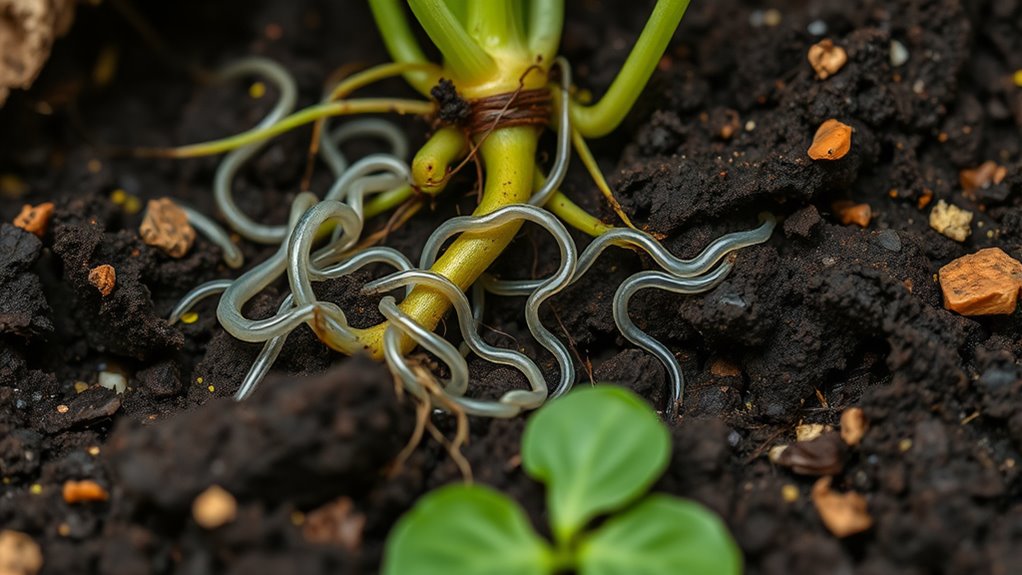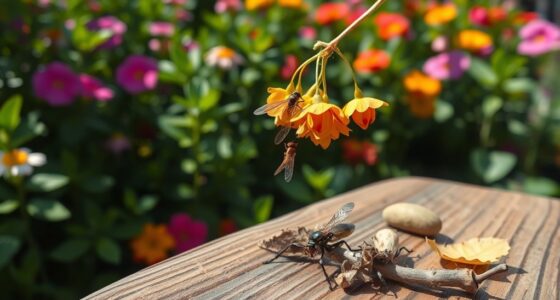Beneficial nematodes are tiny worms that work underground to protect your garden from pests like grubs, beetles, and root maggots. They hunt these pests and release bacteria that kill them quickly, providing a natural alternative to chemicals. Applying them to moist soil in early morning or late evening helps them thrive and do their job. To discover more about how these helpful creatures can transform your gardening routine, keep exploring their benefits and application tips.
Key Takeaways
- Beneficial nematodes are microscopic worms that naturally control soil pests like grubs and beetles.
- They target pests at larval stages, reducing infestations and promoting healthy plant growth.
- Applying nematodes is eco-friendly, safe for plants, beneficial insects, and soil health.
- Proper application involves moist soil, ideally in early morning or late evening, to protect nematodes.
- They reproduce in the soil, providing ongoing pest control and supporting sustainable gardening practices.

Beneficial nematodes are microscopic worms that naturally help control soil-dwelling pests in your garden. These tiny allies work underground, hunting down pests like grubs, beetles, and root maggots that can damage your plants. Using beneficial nematodes is a smart, eco-friendly way to improve soil health and manage pests without relying on chemical pesticides. When you introduce these worms into your soil, you’re fostering a balanced environment that encourages healthy plant growth. They target pests at the larval stage, preventing infestations from developing and spreading. By doing so, you help maintain a resilient garden ecosystem that’s less dependent on chemical interventions, which can harm beneficial insects and soil microbes.
Pest management with beneficial nematodes is straightforward and effective. You simply purchase a nematode product suitable for your pest problem, dilute it according to the instructions, and apply it to moist soil. Because nematodes are sensitive to sunlight and dry conditions, it’s best to apply them in the early morning, late evening, or on cloudy days when the soil is damp. Once in the soil, they disperse and seek out pests, entering their bodies and releasing bacteria that kill the pests within a few days. This biological control method is highly targeted, so it won’t harm your plants, pets, or beneficial insects like bees and ladybugs. Plus, since nematodes reproduce in the soil, their populations can grow naturally over time, providing ongoing pest suppression.
Incorporating beneficial nematodes into your pest management routine can improve overall soil health. Unlike chemical treatments that may harm beneficial soil organisms, nematodes contribute to a healthy underground environment. They help break down organic matter and control pest populations naturally, fostering a thriving soil ecosystem. As a result, your plants can absorb nutrients more effectively, leading to stronger growth and better yields. Using nematodes also reduces the need for repeated chemical applications, which can lead to pest resistance and soil degradation over time. By choosing biological controls like beneficial nematodes, you promote sustainable gardening practices that support long-term soil vitality and pest suppression.
Frequently Asked Questions
How Do Beneficial Nematodes Affect Beneficial Soil Microorganisms?
Beneficial nematodes help maintain soil health by targeting pests without harming beneficial soil microorganisms. They actually support microbial diversity by reducing pest populations that compete with helpful microbes for nutrients. When you use nematodes, you promote a balanced soil ecosystem, encouraging beneficial microbes to thrive. This natural pest control method keeps your soil healthy and productive, ensuring your garden benefits from a vibrant, diverse microbial community.
Can Beneficial Nematodes Control Fungal Pests in the Garden?
You might wonder if beneficial nematodes can control fungal pests. While nematode efficacy mainly targets soil-dwelling insects, they don’t directly manage fungal pests. For fungal pest management, focus on proper watering, good airflow, and organic fungicides. Beneficial nematodes excel at controlling insect larvae, but for fungi, you’ll need specific fungal controls. Use an integrated approach to keep your garden healthy and pest-free.
Are Beneficial Nematodes Safe for Pets and Children?
You might wonder if beneficial nematodes are safe for your pets and children. Rest assured, they are generally considered safe for pet safety and child safety because they’re naturally occurring organisms that target specific soil pests. When used correctly, beneficial nematodes don’t pose risks to humans or animals. Always follow application instructions, and wash hands afterward to guarantee safety for everyone enjoying your garden.
How Long Do Beneficial Nematodes Remain Active in the Soil?
Your garden’s defense can last an eternity, but beneficial nematodes generally stay active for weeks to a few months. Soil persistence depends on environmental factors like temperature, moisture, and sunlight, which can either extend or shorten their activity. Keep the soil moist and avoid extreme conditions, so your nematodes can do their job longer. Proper care guarantees they remain effective, protecting your plants for as long as possible.
What Are the Signs of Successful Pest Control With Nematodes?
You’ll notice pest decline as pests become less visible on your plants, and you might see healthier, more robust plant growth. Successful nematode use often leads to fewer signs of soil-dwelling insects, reduced plant stress, and improved overall plant health. If you observe these changes within a few weeks, it indicates your nematodes are working effectively, helping protect your garden naturally and promoting vibrant, thriving plants.
Conclusion
Think of beneficial nematodes as your garden’s silent knights, patrolling the darkened depths beneath your plants. They tirelessly seek out pests, vanquishing them before they can cause harm, much like guardians in an ancient fortress. By welcoming these tiny defenders, you’re fortifying your garden’s defenses naturally and discreetly. Embrace these natural allies, and watch your garden flourish under their watchful, unseen protection—truly, your grounds’ own bodyguards in the shadows.









